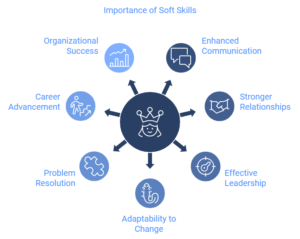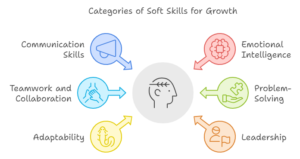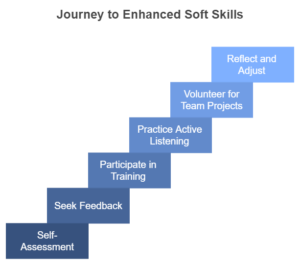Although technical skills are important when it comes to showcasing expertise in your field, but they alone aren’t enough to ensure success. The ability to navigate interpersonal dynamics, communicate effectively, and adapt to new challenges has become increasingly vital. This is where soft skills development comes into play.
What are Soft Skills?
Soft skills refer to a combination of interpersonal abilities, communication skills, emotional intelligence, and character traits that enable individuals to interact harmoniously with others. Unlike hard skills, which are specific, teachable abilities that can be quantified (such as coding or data analysis), soft skills are often more subjective and harder to measure. They encompass a wide array of competencies, including teamwork, adaptability, problem-solving, and time management.
Why Are Soft Skills Important?
Soft skills play a crucial role in how you work with others and respond to the environment around you. They influence your ability to lead, collaborate, and achieve your goals. As automation and artificial intelligence increasingly take over technical tasks, the demand for soft skills will continue to grow.

In today’s complex and rapidly changing work environment, soft skills are essential for several reasons:
- Enhanced Communication: Effective communication is essential in any company. Soft skills facilitate collaboration by lowering misunderstandings, enabling you to communicate ideas clearly, and comprehending others’ viewpoints.
- Stronger Relationships: Building positive relationships with colleagues, clients, and stakeholders is crucial for success. Soft skills help create an environment of trust and respect, enhancing teamwork and cooperation.
- Effective Leadership: Strong leaders possess excellent soft skills. They inspire and motivate teams, manage conflicts, and guide individuals toward common objectives. Leadership isn’t just about authority; it’s about influencing and nurturing others.
- Adaptability to Change: The modern workplace is characterized by rapid technological advancements and shifting market demands. Employees with strong soft skills are better equipped to adapt to these changes, remaining resilient and proactive in the face of challenges.
- Problem Resolution: The ability to solve problems creatively and collaboratively is invaluable. Soft skills empower individuals to navigate conflicts and challenges, fostering a culture of innovation and continuous improvement.
- Career Advancement: Employers increasingly prioritize soft skills when evaluating candidates for promotions and leadership roles. Those who excel in soft skills often find more opportunities for career growth, as they are seen as well-rounded and capable professionals.
- Organizational Success: Businesses thrive when their employees possess strong soft skills. A workforce adept in communication, teamwork, and adaptability contributes to a positive workplace culture, enhanced productivity, and better overall performance.
Types of Soft Skills
Understanding the various types of soft skills is crucial for personal and professional growth. Here are some key categories:

Communication Skills
Effective communication involves not just speaking clearly but also listening actively and conveying ideas in a manner that others understand. This includes verbal, non-verbal, and written communication. Strong communicators can articulate their thoughts succinctly and persuade others while fostering an atmosphere of trust.
Importance: Effective communication is the backbone of any successful organization. It includes the ability to express ideas clearly, listen attentively, and engage in constructive dialogue. Employees with strong communication skills can articulate their thoughts succinctly, whether in writing or verbally, ensuring that messages are understood without ambiguity.
Examples:
- Active Listening: This entails giving the speaker your whole attention, comprehending what they’re saying, and intelligently answering. For example, an employee who engages in active listening during team meetings might help to clear up confusion and promote cooperation.
- Non-Verbal Communication: Body language, eye contact, and facial expressions play a significant role in communication. Being aware of these cues can enhance interactions with colleagues and clients.
Emotional Intelligence
Emotional intelligence (EQ) is the ability to recognize and manage your emotions and those of others. High EQ enables you to empathize with colleagues, manage stress, and handle interpersonal relationships judiciously and empathetically. This skill is crucial for conflict resolution and fostering a positive workplace culture.
Importance: Emotional intelligence (EQ) is the ability to recognize, understand, and manage one’s emotions and those of others. High EQ leads to better relationships, effective communication, and conflict resolution. Employees with strong emotional intelligence can navigate social complexities and build rapport with colleagues.
Examples:
- Empathy: Understanding and sharing the feelings of others can foster a supportive workplace. For instance, an employee who notices a colleague struggling with personal issues might offer support or understanding, creating a more compassionate work environment.
- Self-Regulation: Employees who manage their emotions effectively can remain calm under pressure, allowing them to respond thoughtfully rather than react impulsively during stressful situations.
Teamwork and Collaboration
In most workplaces, the capacity to collaborate with others is crucial. This entails being receptive to criticism, appreciating different viewpoints, and participating in group projects. Mutual respect and understanding are essential for effective teamwork, which enables groups to accomplish shared objectives more quickly.
Importance: In today’s work environment, most projects require collaboration across diverse teams. The ability to work well with others enhances productivity and innovation. Teamwork is not just about working alongside others; it’s about creating an environment where all members feel valued and empowered to contribute.
Examples:
- Sharing Responsibilities: An effective team player is willing to take on tasks and help others when needed. This could involve stepping in to support a colleague who is overwhelmed or sharing insights during brainstorming sessions.
- Constructive Feedback: Providing and receiving feedback graciously can lead to personal and team growth. Employees should be open to constructive criticism and willing to offer support to their peers.
Problem-Solving
Problem-solving skills involve the ability to think critically and creatively to find solutions to challenges. This requires analytical thinking, resourcefulness, and the willingness to explore various approaches. Individuals with strong problem-solving skills can navigate complex situations and make informed decisions that benefit the organization.
Importance: The ability to identify problems, analyze situations, and develop effective solutions is crucial in any role. Strong problem-solving skills enable employees to tackle challenges head-on and contribute to the organization’s success.
Examples:
- Analytical Thinking: Employees should be able to dissect complex issues, identify root causes, and evaluate potential solutions. For instance, if a project is falling behind schedule, a skilled problem solver will analyze the reasons and propose actionable steps to get back on track.
- Creativity: Innovative thinking can lead to new approaches and solutions that enhance efficiency. Encouraging brainstorming sessions and open discussions can stimulate creative problem-solving within teams.
Adaptability
In an ever-evolving job landscape, the ability to adapt to change and remain flexible in the face of new challenges is vital. Adaptable employees can adjust their strategies and approaches based on shifting circumstances, which is increasingly important in today’s fast-paced world.
Importance: The pace of change in the workplace continues to accelerate due to technological advancements and market shifts. Employees who are adaptable can pivot quickly and effectively respond to new challenges. Adaptability is crucial for resilience and long-term success.
Examples:
- Embracing Change: Rather than resisting new processes or technologies, adaptable employees seek to understand and integrate these changes into their workflow.
- Problem-Solving in Uncertainty: Adaptable employees thrive in ambiguous situations, demonstrating creativity in finding solutions when faced with unexpected obstacles.
Leadership
Leadership skills aren’t reserved solely for managers; being able to motivate and guide a team is an important soft skill that can lead to career advancement. Effective leaders inspire others, facilitate collaboration, and drive projects forward.
Importance: Leadership is not confined to those in managerial positions; it encompasses the ability to inspire and guide others, regardless of your role. Strong leadership skills foster a collaborative and productive work environment.
Examples:
- Motivating Others: An effective leader encourages team members to perform at their best, recognizing their contributions and providing support when needed.
- Decision-making: Good leaders make informed decisions by weighing options, considering input from team members, and being willing to take responsibility for outcomes.
Time Management
Importance: Managing time effectively is essential for maximizing productivity and meeting deadlines. Employees who excel in time management can prioritize tasks, allocate resources wisely, and maintain a healthy work-life balance.
Examples:
- Prioritization: Employees should be able to assess the urgency and importance of tasks, focusing on high-impact activities. Using tools like to-do lists or digital planners can enhance priority.
- Setting Goals: Establishing clear, achievable goals allows employees to stay organized and track progress, ensuring that they remain focused and productive throughout their workday.
Also Read: Top Strategies to Ace Your Job Interview with the STAR Method
Soft Skills Development
Developing soft skills is a continuous process that involves practice and reflection. Here are some effective strategies:

Self-Assessment
Begin by assessing your current soft skills. Identify areas for improvement and set specific, measurable goals. Consider using self-assessment tools or seeking feedback from trusted colleagues.
Seek Feedback
Ask for feedback from colleagues or supervisors. Constructive criticism can provide valuable insights into your interpersonal dynamics. Be open to receiving input and willing to make changes based on that feedback.
Participate in Training
Enrol in workshops or online courses focusing on soft skills development. Many organizations offer training sessions that can enhance these abilities. Look for programs that provide real-world scenarios for practice.
Practice Active Listening
Engage in conversations with the intent to listen rather than to respond. This can significantly improve your communication and interpersonal skills. Try summarizing what others have said to confirm your understanding.
Volunteer for Team Projects
Working in teams can provide a practical setting to develop skills like collaboration, problem-solving, and adaptability. Take the initiative to lead projects or contribute to team discussions.
Reflect and Adjust
Reflect on your interactions and experiences regularly. Analyze what went well and what could be improved, adjusting your approach accordingly. Keeping a journal can help you track your progress.
How to Master Soft Skills
Mastering soft skills requires dedication and ongoing effort. Here are some tips for achieving mastery:
Continuous Learning
Stay informed about new developments in soft skills training by reading books, attending seminars, and participating in relevant online courses. Learning from various sources can provide different perspectives and techniques.
Practice Regularly
Make it a habit to practice soft skills in everyday situations. The more you practice, the more natural these skills will become. Engage with diverse groups to expand your experiences.
Network with Diverse Groups
Engaging with individuals from different backgrounds and industries can broaden your perspective and enhance your adaptability. This exposure can deepen your understanding of various communication styles and work approaches.
Mentorship
Consider seeking a mentor who excels in soft skills. Learning from their experiences can provide you with insights and techniques that may be beneficial. A mentor can also offer guidance and support as you develop your skills.
Benefits of Soft Skill Development
Investing in soft skills development yields numerous benefits:
Enhanced Career Opportunities
Professionals with strong soft skills often find more opportunities for career advancement. Companies value employees who can effectively collaborate and lead teams.
Improved Workplace Relationships
Effective communication and empathy can lead to better relationships with colleagues and management. Strong relationships foster a positive work environment and enhance collaboration.
Increased Job Satisfaction
Developing soft skills can lead to a more fulfilling work experience as you become more effective in your role. Satisfied employees tend to be more engaged and motivated.
Greater Adaptability
As you enhance your soft skills, your ability to adapt to changing work environments improves, making you a more resilient employee. This adaptability is crucial in a constantly changing landscape.
